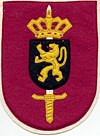| Royal Military Academy (Belgium) | |
|---|---|
 | |
| Type | military university |
| Academic staff | Polytechnics; Social and Military Sciences |
| Students | 400/year |
| Postgraduates | Master in Science; Master in Social and Military Sciences |
| Location | Brussels, Belgium |
| Affiliations | ISMS; |
| Website | Royal Military Academy |
 | |
Academy's coat of arms  Polytechnique faculty logo  S.M.S. faculty logo | |
The Royal Military Academy (RMA) is the military university of Belgium. The school is responsible for the education of the officers of the four components of the Belgian defence (Army, Air Force, Navy, Medical). The school is located in Brussels in a building constructed by the architects Henri Maquet and Henri Van Dievoet. The courses are given in French, Dutch and English.
There are two faculties
- The Polytechnics faculty: Master of science in engineering
- The Social and Military Sciences faculty: Master in Social and Military Sciences
There is also the special division and the Royal Higher Institute of Defence, which are part of the RMA.
Admission
Admission to the University is only possible through public exams. First, candidates have to pass military test common to all Belgian military categories (Medical, Endurance and physical tests, and a psychologic evaluation). After passing these, applying students have to compete with each other in public exams. These consist of mathematics and French & Dutch written language tests. The University can only accommodate a certain number of student each year (rough estimate: 400/year) (strongly influenced by the need for officers of the Belgian military). Applying students have to compete with each other for these limited places.
Bologna
Since 2003, the Academy made some changes to its faculties to conform with the Bologna Process. Both degrees are now taught within a 5 year span. After the first three years, students receive a Bachelor Degree. The Master's Degree can be attained in succeeding the following 2 years. But in contrast to the common Bologna implementation, flexibility in attaining the degrees isn't greatly augmented. Student can only fail for one year within all five. Re-exams are however possible. Student cannot take courses with them to the next year, they have to pass the re-exams. Before 2003 most courses were fixed, however, students had a limited choice between optional courses. A lot of flexibility regarding course choices was added by implementing course modules. Students can opt for certain modules which each hold specific and related courses. For example:
- Law module
- Psychology module
- Weapon systems module (ballistics)
- Management module
- Marine science module
- History module
- Communication & Information Systems module (Telecom, computer security, electricity).
- ...
The choice of course module isn't always free, but is related with the chosen military speciality of the student (Infantry, Logistics, Transmission, Air traffic control, Artillery, Naval Forces,..) and often mandatory. The majority of the courses remains fixed in the bachelor years. In the Master years, the student follow more modules than fixed courses.
Nationalities

Soldiers at the Royal Military Academy on parade on Belgian National Day, 2011.
The grand majority of the students have the Belgian nationality, but cooperation with other countries has opened up the University to other nationalities. A lot of Luxemburgian officers receive their education in the University and have a long history in it.
More recently the University received military students from Canada, Congo, Morocco, Tunisia and Rwanda, thanks to military cooperation, training and development programs. However, these student often belong to the social elite of their home country. The foreign student have, in contrast to the Belgian students, no obligation to follow the Flemish (or Dutch) language courses.
Notable faculty
- Jean Stas (1813–1891), chemistry
Notable alumni
Royal family
The tradition of the royal princes to study at the academy is continuous.
| |
|
Others
|
Affiliation
The Belgian Staff College was voted into the International Society of Military Sciences during the November 2011 meeting.[1]
References
| Wikimedia Commons has media related to Royal Military Academy, Belgium. |
Coordinates: 50°50′41″N 04°23′33″E / 50.84472°N 4.3925°E
The original article can be found at Royal Military Academy (Belgium) and the edit history here.